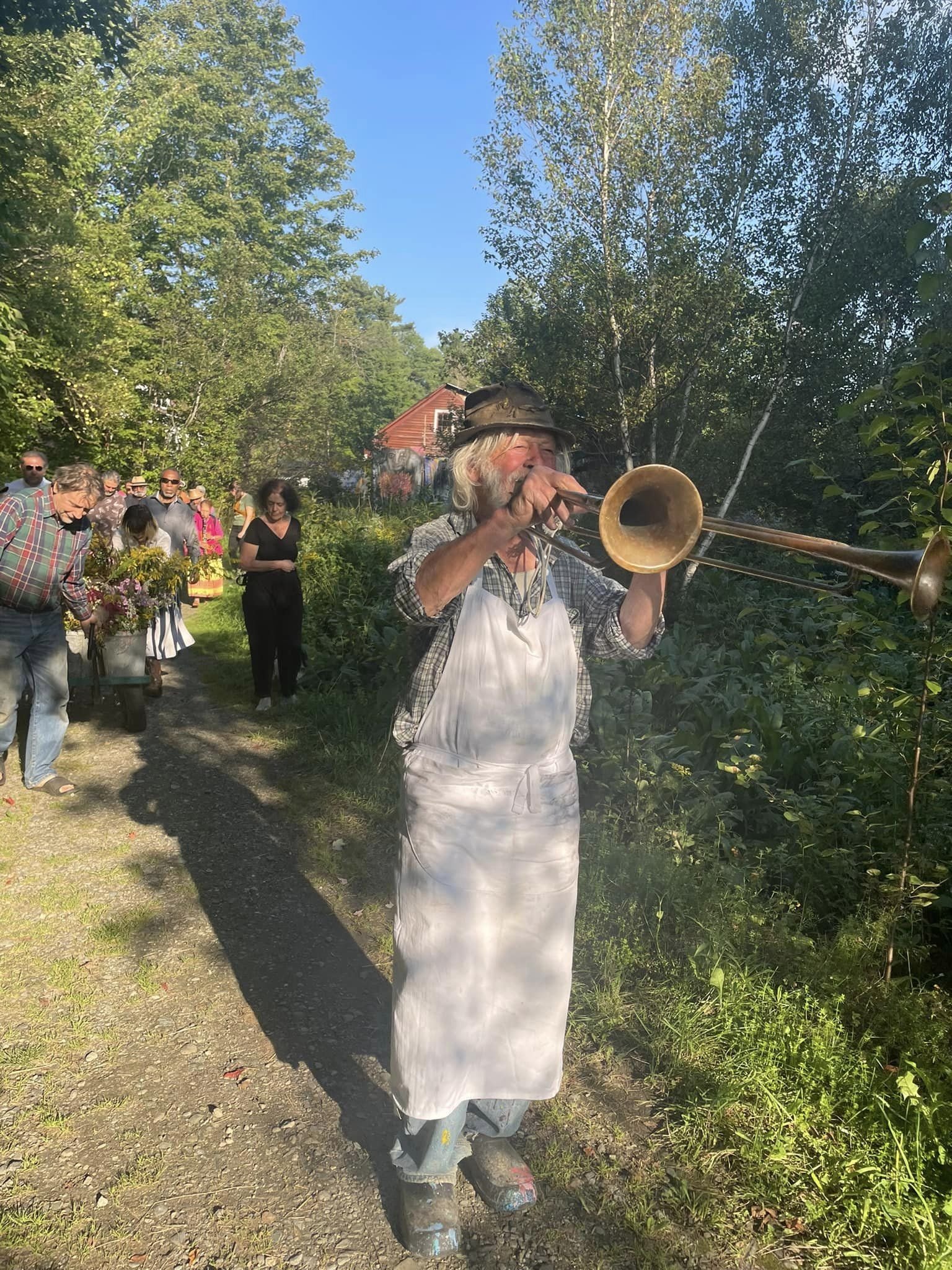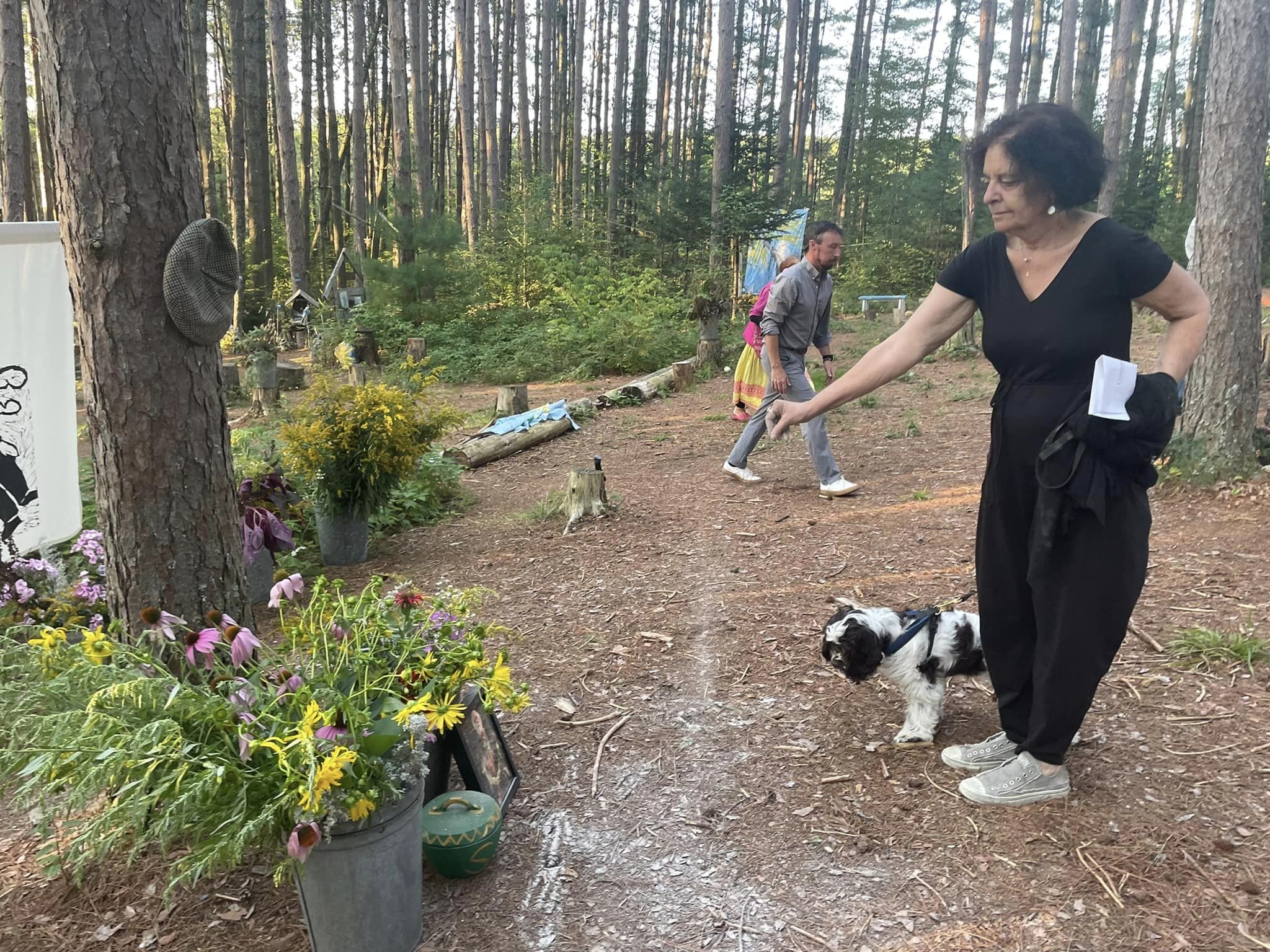Celebrating the Life & Legacy of George Bartenieff
Coffeehouse Chronicles/#166
October 1, 2022 at 3 pm
LaMama ETC, The Ellen Stewart Theater, 64 East 4th St. NYC
Link to event
George Bartenieff, as Robert, in "The Beekeeper's Daughter," written and directed by Karen Malpede, 2016, photograph by Beatriz Schiller
In a pine wood on the Bread and Puppet land
In a pine wood on the Bread and Puppet land, the trees fifty feet tall or more, straight black bark, green needles branching out far above our heads is the memorial grove. What you think you cannot do alone, put your hands into the ashes of the one you loved, his earthly remains, they are gritty with burnt bone, if you do not know, becomes possible, even sacral, in community. There is a line of Yeats, a signature line, so-to-speak, I have always loved. ‘Ask not where a (wo)man’s glory begins or ends but say my glory was I had such friends.” Yeats, too, made a theater with those he admired and loved. The Bread and Puppet Theater, sixty years on is going strong. Our Theater Three Collaborative is being laid to rest this day as we leave George’s ashes here in a grove where many of our artist-friends are also commemorated with small memorial houses or other structures. To the right lies the grave of Elka Schumann, a small mound of earth, already growing things. Her body is here because the land is hers; in compliance with Vermont law, the remains of her friends are memories only. Judith Malina has a small edifice down the slope. She introduced George and me when she directed my play Us in which he starred, for which he won an Obie. Grace Paley is to the right. My friend and George’s who anointed our early relationship with her words, ‘I am so glad you two are together,” at a protest march against the Gulf War I. There are many others, Bob Nichols, Grace’s husband, who wrote the early street theater plays in which George performed.
We are, for the moment, the survivors, Peter and I. He is holding his trumpets with which he led the Bread and Puppet brass and percussion band as we walked and danced from the farm down the slope to this pine grove. “I found Lady Gregory at eighty on her knees, planting trees,” Yeats writes. On her estate at Coole Park is a large oak in which the Abbey artists carved their names, visible still. “That inquiring man, John Singe,” wrote Yeats, “who dying took the living world for text.”
“Nature intervened in all our words. We walked with beauty inside and out…” I wrote in one of George’s favorite speeches as Uncle from Extreme Whether, a speech he was rehearsing in his final weeks of life hoping to perform it once again at LaMama’s Coffee House in his honor, now his memorial service.
With me are Ynestra King, my friend of 40 years, a founder of ecofeminism, Michal Gamily, who is producing George’s memorial, Patrick Mintu, a journalist from Congo who became our trusted friend and driver in the final year of George’s life and George’s son Alex. All will speak. Alex will read from George’s diary about playing Diagonal Man to rapturous response in Poland, caught in marshal law. Michael Romanshyn and Howie Cantor were also in Peter’s production of Diagonal Man, in which George played the sloping fellow, feet on the earth, straining toward freedom that very freedom the Polish audience was straining toward. The banner from that play, done in the 80s, marks his memorial mound.
“Bring something to nail to a tree,” Peter had said on the phone. I have George’s Irish cap which he wore as Uncle and again as Sam Brown in Blue Valiant and which he wore on many trips to doctors, hospitals and back, and many walks, shorter and shorter they became, around our neighborhood. George loved trees. He wrote about them, delighted in them, often hugged them spontaneously.
My Tribute to George
Karen Malpede
“To praise is the whole thing. A man who can praise/ comes toward us like ore out of the silences/of rock. His heart, that dies, pressed out/for others a wine that is fresh forever./ When the god’s energy takes hold of him,/his voice never collapses in the dust./Everything turns to vineyards, everything turns to grapes./made ready for harvest by his powerful south.’ These are Rilke’s lines, which the poet Robert Blaze, inspired by Robert Graves, recites in my play The Beekeeper’s Daughter. And how George loved to say them. George believed in the potency of praise, and he made it a practice to praise often, me and many others. He had favorite speeches he kept in his memory for reciting, as his eyes dimmed and he could no longer read. He would often say to me about a line from one of my plays or from the Klemperer diaries, or Shakespeare, for that matter, “Now I finally understand its meaning. I am getting better.” He had hoped to be here today and was rerehearsing his favorite pond speech from “Extreme Whether” even as his glorious voice weakened.
I had the privilege of writing for this extraordinary actor, and because he could do everything, I could do anything I might imagine. He left me completely free. Because we thought and felt so closely about the world nothing I proposed was alien, though it might be strange. I could start a play, as I did in Another Life, with a ten minute monologue, tongue and mind-twister, giving him the most nonlike him character, a mogul who heads the black site torture business Deepwater, a character based on Erik Prince and moguls everywhere and who prefigures Donald Trump. This play about the US torture program was compared to Mary Shelley’s Frankenstein by Darius Rejali, the author of Torture and Democracy because with just six characters “it captures the essence of a decade.” We never allowed Another Life to be reviewed, we knew there is not a critic in the land who might understand, but when Judith Malina saw it she said, “It’s a brilliant play. It’s too brilliant for the culture. It should win a Pulitzer Prize. It won’t but it should.”
I could have him swallowed by a near-extinct beast as I did in Better People; have him come out changed from a geneticist into an ecologist who improvised the ending of that play by becoming a series of animals from tiger to praying mantis.
We could find 30 or more characters in the Victor Klemperer diaries whose essence might emerge through George’s Klemperer so that one saw one character imposed upon another in one body and realized how true it is that we are members of one another. I could turn him into an owl as happened in Other Than We, watch him lose language and gain eternity.
George’s great resonance as an actor, his complete commitment to character, to realizing the fullness of being of each one he played, set him apart when he performed in other theaters. People had to decide what to make of him. But, at Theater Three Collaborative, his aesthetic of physical and emotional completeness set the tone. Other actors rose to meet him on his ground.
To say that ours was a rare artistic collaboration is also to miss the point for we loved one another unconditionally and our work issued from that love. He believed in me more than I believed in myself, but never more than I believed in him. Aside from being an actor, a profession whose practitioners are not generally known for their generosity toward others, George embraced another mission. On my birthday, in 2017, he wrote: “Chief among my purposes, my destiny, is to engender and praise the artist self in others and to aid in supporting it.”
It was the greatest honor of my life to be with him, always, and as I promised him he would never be alone, to be next to him in our bed my hand on his heart when it beat its last. It was my greatest joy to hear his laughter in the morning, to wake at 3 am to continue till dawn our endless conversation about work and world, to spend pandemic evenings reading aloud great literature from Hardy to Gordimer and LeGuin, to accompany him on his many journeys into his memories of childhood in Nazi Germany and through an illness he managed with such grace few people guessed how sick he was, and even I and his healers were often fooled by his spirit. It was thrilling to facilitate his final performance with Kathy Chalfant of a character, Sam, so unlike him yet a character he adored and to watch him, compromised by age and infirmity, but never compromised in imaginative power, soar. And when he could no longer act, he turned to writing with the same dedication to making art that sustained his life.
We lived an unusual, financially completely irresponsible, rebellious life. We never cowered or quaked and if we suffered, which we did, we understood from where that suffering came and we rebelled against injustice, bad theater, and the infliction of pain. He so loved this world. He was worried at the end, not about himself, but about the future of life on earth.
George spent increasing amounts of time looking up from his writing, out our window at the trees across the way; those trees in summer leaf were the last nature he saw, the last time I wheeled him to the window. Three years earlier, he wrote: “The number one proof of God—it is The Tree. The kindest, most loving of all creatures on earth is the tree. Trees of all kinds, both large and small give everything to support all other life, as home, as food, both fruit and its own body while alive and in decay. As shade from the heat of the sun. As hiding for creatures that can climb, burrow into its body, in death and decay it creates new soil. As home for birds, for insects, squirrels, ants, bears, and Homo sapiens. How does one creature give life to all?”
To honor his memory, we, too, must embrace the living world, and all her creatures, because of all things known, that is the most difficult.



